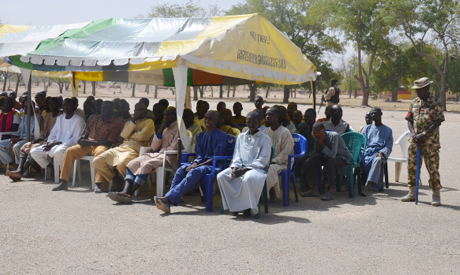
File photo, men who were detained by Nigeria army who have no links to Boko Haram sit under a canopy before their release at the Giwa military barracks in Maiduguri, Nigeria (Photo: AP)
Nigeria hosts a security summit Saturday on ending the threat from Boko Haram, with increasing signs of closer military cooperation between regional powers and international support.
French President Francois Hollande, US Deputy Secretary of State Antony Blinken and Britain's top diplomat Philip Hammond are among the senior foreign dignitaries expected in Abuja.
The leaders of Nigeria's neighbours Benin, Cameroon, Chad and Niger are also invited, along with delegations from the European Union and the West African and Central African blocs.
Nigeria said this week "the successful conclusion of ongoing military operations" and "the speedy resolution of the humanitarian crises" would dominate the talks.
Boko Haram was named in the latest Global Terrorism Index as "the most deadly terrorist group in the world" in 2014. An estimated 20,000 people have been killed since 2009.
But Nigeria's military maintains its fight-back since early 2015 has the Islamists in disarray and recently announced the launch of operations inside the rebels' Sambisa Forest stronghold.
"The idea is to be able to announce (at the summit)... that this sanctuary no longer exists," a source close to Chadian President Idriss Deby told AFP earlier this month.
"That is a military and also a political imperative."
Yet there are mounting concerns for the future of more than 2.6 million people displaced by the violence, with many living in host communities or camps and affected by chronic food shortages.
Borno -- the Nigerian state worst-hit by the violence -- last month said there was a "food crisis" and it needed $5.9 billion (5.1 billion euros) to rebuild shattered homes and infrastructure.
The election of former military ruler Muhammadu Buhari as Nigeria's president has given fresh impetus to the military counter-insurgency.
Buhari, who last December said the militants were "technically" defeated despite repeated suicide attacks, has pushed hard for a new regional force, which was supposed to have deployed last July.
The status of the African Union-backed force, comprising some 8,500 troops from Nigeria, Benin, Cameroon, Chad and Niger, is likely to figure prominently in Saturday's talks.
Plugging gaps and improving coordination between armies operating largely independently is seen as vital, with Boko Haram now thought to be in remote border areas on and around Lake Chad.
The Multi-National Joint Task Force commander, General Lamidi Adeosun, has requested flat-bottomed boats to help soldiers fight on Lake Chad, where Nigeria borders Chad, Cameroon and Niger.
Boko Haram has pledged allegiance to the Islamic State group and Nigerians have been reported fighting in lawless Libya, as well as having ties with Al-Qaeda-linked groups in the wider Sahel.
The International Crisis Group has warned about premature declarations of victory and suggested Boko Haram could yet transform into a "terror group with a longer reach".
The summit -- two years after the first one in Paris -- should go beyond closer military support to address causes of the conflict, its effects and prevent similar, future threats, it added.
Recent weeks have seen indications of greater Western support for Nigeria and a flurry of diplomatic visits.
Nigeria has struggled under previous administrations to acquire military hardware because of concerns about its army's poor human rights record as well as endemic corruption in procurement.
US officials said last week Washington was considering selling Nigeria a dozen A-29 Super Tucano ground attack planes of the type supplied to Afghanistan to fight Taliban guerrillas.
Drones are already being flown over northeast Nigeria from a US base in northern Cameroon, while President Barack Obama has promised specialist troops to assist training.
Britain has sent special forces trainers to northeast Nigeria.
France, which has a military base in Chad's capital, N'Djamena for anti-Islamist operations in the Sahel, has promised more intelligence sharing.
French troops are seen as key to liaise between English-speaking Nigeria and its francophone neighbours, whose relations have long been tense.
Short link: